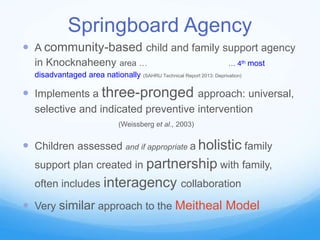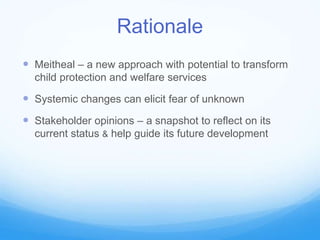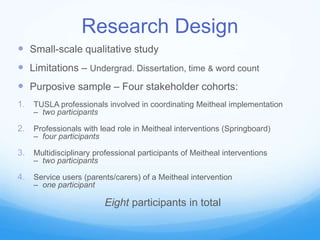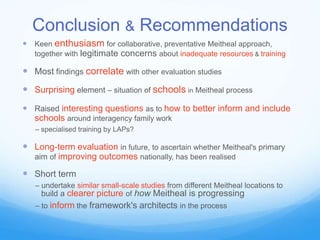The document outlines the Meitheal Model, a framework implemented by Tusla to provide a more integrated preventative approach to child and family interventions. It discusses stakeholder perspectives on the early implementation of the model through interviews. Key findings include enthusiasm for the model's partnership approach and interagency collaboration. However, concerns around resources and training needs were also raised, particularly engaging schools. The conclusion recommends further evaluation and stakeholder input to help guide Meitheal's development.


![[T]he implementation of Meitheal, a
National Practice Model for all
Agencies Working with Children,
Young People and their Families...will
deliver a standard and consistent
approach on how we support and
intervene with children and families.
(Tusla, 2014, p.2)](https://image.slidesharecdn.com/69dda673-8517-4787-9d65-3d3e552fcd5b-160502204952/85/SIG-Conf-Meitheal-PPTX-3-320.jpg)







![Findings cont.
Relationship-building – total consensus on its importance
Meitheal will "stand or fall on the quality of [the] relationships” (Senior Manager for PPFS)
– with families; with professionals
– implies trust
– where 1 is not important and 10 is vitally important – all scored between 9 and 10
Support
– All TUSLA and leading professional participants agreed they were well supported by their
colleagues
– Cited importance of mutual support – the “Team-around-the-worker” (Lead Practitioner 2)
Correlate with similar studies in the main](https://image.slidesharecdn.com/69dda673-8517-4787-9d65-3d3e552fcd5b-160502204952/85/SIG-Conf-Meitheal-PPTX-11-320.jpg)
![Findings cont.
THEME TWO: Resourcing & Training Needs
Resourcing needs
"A lot of the main statutory bodies have gone through huge amounts of change ...
which makes it much more difficult ... so there's again a need for more integrated, more
coordinated planning … from government down” (Senior Manager for PPFS)
Meitheal Coordinators required – a factor that was “standing out” (Senior Manager
for PPFS)
Extra workload for Practitioners with lead roles – coordinating/chairing meetings;
minutes
Investment needed for “bodies on the ground” [because] “it’s meant to be
wraparound … if there are waiting lists … it won’t work!” (CFSN Coordinator)](https://image.slidesharecdn.com/69dda673-8517-4787-9d65-3d3e552fcd5b-160502204952/85/SIG-Conf-Meitheal-PPTX-12-320.jpg)
![Findings cont.
Training needs
Providing clarity – explaining Meitheal NOT answer to crisis; different roles;
needed in order to streamline things as "people can veer off into different ...
understandings" (SCW)
Changing mindsets, getting buy-in
"[Some] professionals ... wouldn't even respond to the request to have a Meitheal ... and
things still are breaking down but they're still not buying in, that's quite difficult” (LP1)
– Protective of their work / methodologies
– Fear of unknown / change / being asked to do more with same
– A barrier to interagency working – need to develop a culture
Correlate with similar studies in the main](https://image.slidesharecdn.com/69dda673-8517-4787-9d65-3d3e552fcd5b-160502204952/85/SIG-Conf-Meitheal-PPTX-13-320.jpg)


